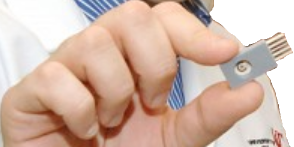Getting blood work done is generally not the most simple or satisfying experience. Often it requires blood to be drawn from a vein, which is uncomfortable even if you don’t have a fear of blood or needles. On top of that, the results of the test take between three and nine months to finally get back to you. A research team at the University of Cincinnati is perfecting a new biosensor that aims to make the process considerably easier to bear.
The UC team’s new sensor is completely portable; it is only the size of a matchbox cover. It can perform tests with only a prick of blood, as opposed to a complete drawing from a vein. Perhaps most impressively, it evaluates the blood sample in real-time, so there’s zero waiting time for the results of the test. This is perhaps the most important aspect of the biosensor, as it’s often critical to know the results of a blood test immediately. It does this by simply plugging into a USB port on a computer.
 (The UC team's biosensor, held by a researcher for size comparison. Image courtesy of UC)
(The UC team's biosensor, held by a researcher for size comparison. Image courtesy of UC)
The UC sensor’s primary function is that of a sophisticated (if drastically shrunk) metal detector. Certain metals that are common in today’s environment thanks to factory production are harmful to the human body in large quantities. For instance, manganese is a metal that comprised steel, batteries, and fertilizers, but it also known to be neurotoxic. Lead and cadmium have similar properties. The sensor can check for levels of these and other metals immediately so doctors can be prepared to act as soon as a patient comes in.

An introductory application for this technology is in pediatric care. Children are more sensitive to these toxic metals than adults are, and even small amounts of exposure can cause health problems. With the miniscule metal detector, unsafe levels of these metals can be detected instantly, without drawing more than a few drops of blood. Ian Papautsky (pictured left, courtesy of biomicro.uc.edu), PhD, is the principal investigator for the study. After three years of development and testing, "we are now poised to fully develop the sensor system for point-of-care application,” he claims in a UC article.
The UC metal detector is in the final stages of development and will most likely be commercialized in the near future. For their efforts, the NIH has awarded Papautsky and the team a $1.5 million grant to finish their research. If funding information for the research at UC interests you, consider reading our free University of Cincinnati Funding Stats and Vendor Show Info report, accessible here:
If you are a research scientist or lab supplier interested in networking with others in your field at University of Cincinnati, Biotechnology Calendar, Inc. invites you to attend our annual Cincinnati Bioresearch Product Faire™, held every year on the UC campus. Biotechnology Calendar, Inc. is a full-service science research marketing and events-planning company that hosts events at top research institutions nationwide. If you are interested in attending this show, please click the button below. Otherwise, we encourage you to check out our 2013 schedule and our 2014 schedule for a more complete geographical selection.


